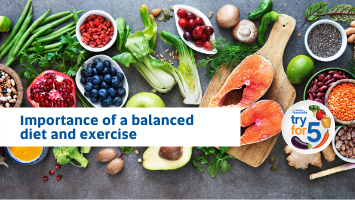
There’s a popular saying – you can’t outrun a bad diet. It doesn’t matter how much exercise you do, if you’re living off takeaway and junk food, your lifestyle is not as healthy as it could be. A lot of people live by the ‘calories-in-calories-out’ or the ‘burn and refuel’ theories, where if you smash an hour long gym session or do 50 laps of the pool you can follow it up with eating a massive chocolate donut or a double cheeseburger or visa-versa. However, that all becomes counter-intuitive to the exercise if you are refueling with energy-dense foods that are high in sugar, salt and saturated fat as opposed to fruit, vegetables, whole grains and dairy.
This National Nutrition Week, we will look at why nutrition is so important for fitness and which foods you should be fueling your body with to get optimal exercise performance and maintain a health physical and mental wellbeing.
How nutrition affects fitness
Different food types cause different reactions to your body. Particular foods cause your hormones to either store or burn fat, build or break down muscle or boost and crash metabolism. For example, sugar drives up insulin levels which causes foods such as chocolate and ice cream to get stored as fat. On the other hand, ‘healthy’ calories like kale trigger insulin’s sister hormone glucagon which releases fat to burn energy. Studies have shown that healthy food intake is the most important part of your exercise programs, so it’s essential to know what foods are best for fueling your body.
Healthy foods you can accompany with exercise
Carbohydrates are the body’s main source of energy and are especially important for those with large exercise schedules. Complex carbs such as whole grains, beans, fruits and vegetables are your best choice, because they help you feel full for longer, stabalise your blood sugar levels and are full of vitamins and minerals.
Protein is just as important because it helps grow and repair your body and for those hitting the gym, it is essential for building muscles. Protein isn’t only found in meat such as chicken, beef and lamb but is also found in eggs, tuna, salmon, milk, yoghurt, lentils, beans and other fish, legumes and dairy products.
Some fats are healthy and need to be included in a balanced diet. Unsaturated fats, such as nuts, avocados, seeds, olives and oils, can help provide essential fatty acids and reduce inflammation.
We all know we are supposed to eat two serves of fruit and five serves of vegetables a day, but do we know why? They are rich sources of fiber, vitamins and minerals while being low in calories and fat. A number of fruit and vegetables are also a source of quercetin, which helps reduce muscle inflammation, increase metabolic rate and lean mass especially amongst athletes. Apples, broccoli, onions and berries are four foods high in quercetin.
It’s important to fuel up before and after exercise, and snacks that combine carbohydrates and protein will help you feel more energised. Some simple superfood snacks to eat before and after exercise and their benefits include:
- Bananas (full of potassium and magnesium)
- Berries (full of vitamins, minerals, antioxidants which reduces inflammation and water which helps with hydration)
- Oats (high in fiber and improves digestion)
- Peanut butter (contains healthy fat, is nutrient dense and high in fibre and plant protein)
So, next time you’re heading out to a UniSA Sport clubs training session or before you represent Team UniSA at an intervarsity event, remember to grab an apple, banana or some nuts to make sure you’re giving yourself the best chance of optimal performance!